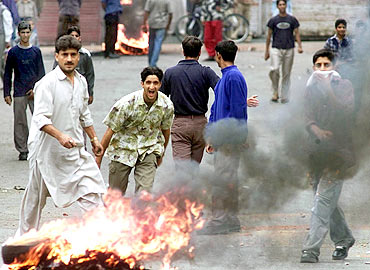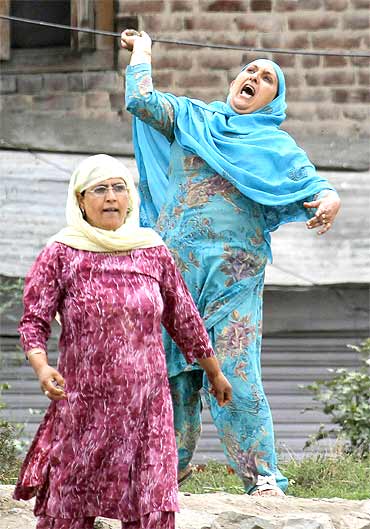Photographs: Reuters
Heightening its rhetoric, Pakistan on Sunday asked New Delhi to change its 'inflexible' policy on Kashmir, claiming that the state is not an integral part of India and the issue cannot be resolved within the ambit of the Indian Constitution.
India will have to change its approach and policy on the Kashmir issue, Pakistan Foreign Office spokesman Abdul Basit told a TV news channel.
Change your policy on Kashmir, Pak tells India
Photographs: Reuters
"When there is a change in Indian policy, which has been inflexible in the past, then certainly talks will prove beneficial between the two countries," he said.
He said the Kashmir problem is an internationally recognised issue and the United Nations has passed resolutions for its solution. Basit claimed that Jammu and Kashmir is not an integral part of India and the Kashmir issue cannot be resolved within the Constitution of India.
Change your policy on Kashmir, Pak tells India
Photographs: Reuters
Ultimately, the Kashmir issue will have to be settled in accordance with the 'aspirations' of the Kashmiri people, he said. Pakistan has always tried to peacefully resolve all issues with India, particularly the Kashmir problem, he claimed.
Basit alleged India has used 'brute force' in Jammu and Kashmir since June. Pakistan wants that "Indian atrocities should be stopped," he added.
Change your policy on Kashmir, Pak tells India
Photographs: Reuters
Replying to a question, he said the Kashmir issue has been discussed by the two countries for decades. It was at the top of the agenda in the composite dialogue process but India "never seriously tried to resolve the issue," he claimed.
"Whenever the dialogue process is restored, we hope India will come up with a realistic approach," he said.
Talks for the sake of talks will not be fruitful and there is a need for result-oriented dialogue, Basit said.





article